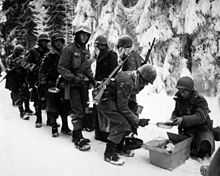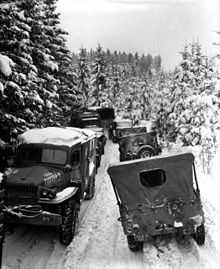87th Infantry Division (United States)
| 87th Infantry Division | |
|---|---|
|
87th Infantry Division shoulder sleeve insignia | |
| Active |
1942–45 1946–54 1993–present |
| Country |
|
| Branch |
|
| Type | Infantry |
| Size | Division |
| Nickname | "Golden Acorn" (special designation)[1] |
| Motto | Stalwart and Strong |
| Engagements | |
| Insignia | |
| Distinctive unit insignia |
|
| US infantry divisions (1939–present) | |
|---|---|
| Previous | Next |
| 86th Infantry Division | 88th Infantry Division |
The 87th Infantry Division ("Golden Acorn"[1]) was a unit of the United States Army in World War I and World War II.
World War I
- 87th Division was a National Army division allocated to Arkansas, Louisiana and Mississippi.
- Was activated at Camp Pike, Arkansas on 25 August 1917.
- Went overseas in September 1918, was utilized as a pool of laborers.
- Returned to the Continental US in January 1919 to Camp Dix, New Jersey, and was deactivated in February 1919.
- Was reassigned to the Organized Reserve program in 1921, and allocated to Alabama, Louisiana and Mississippi.
- Commanders:
- MG Samuel D. Sturgis (25 August 1917).
- BG Robert Campbell Van Vliet (13 November 1917).
- MG Samuel D. Sturgis.
- COL John O'Shea (6 October 1918).
- MG Samuel D. Sturgis (23 October 1918).
- BG W. F. Martin (22 November 1918).
World War II
- Activated: 15 December 1942 at Camp McCain, Mississippi.
- Training: Moved to the Tennessee Maneuver Area on 3 December 1943, for the Second Army #4 Tennessee Maneuvers; Consolidated to Fort Jackson, South Carolina on 20 January 1944 for divisional training.
- Staged at Camp Kilmer, at Stelton (now Edison), New Jersey, on 10 October 1944 until it received its Port Call to the New York Port of Embarkation in Brooklyn, NY.
- Overseas: Deployed to the European Theater on 17 October 1944.
- Arrived England on 12 November 1944, and Staged for movement to France.
- Assigned to US 3rd Army on 25 November 1944.
- Arrived La Havre, France 28 November 1944.
- Was further assigned to US III Corps on 4 December 1944, and to US XII Corps on 11 December 1944, and to US XV Corps on 21 December 1944, and to US VIII Corps on 29 December 1944.
- Crossed into Belgium on 12 January 1945, and returned to XII Corps on 14 January 1945.
- Crossed into Luxembourg on 21 January 1945, and assigned to VIII Corps on 25 January 1945.
- Due to discontinuity of German railroad system, 87th ID was routed to Germany by returning to Belgium on 3 February 1945.
- Entered Germany 16 March 1945, and remained to VE Day.
- Returned to Continental US at New York Port of Embarkation on 11 July 1945, and proceeded to Fort Benning, Georgia on 14 July 1945 to prepare for deployment to Japan.
- Was at Fort Benning on VJ Day.
- 87th Infantry Division was deactivated on 21 September 1945, at Fort Benning, Georgia.
- Campaigns: Rhineland, Ardennes-Alsace, Central Europe.
- Days of combat: 154.
- Distinguished Unit Citation: 2.
- Awards:
- Medal of Honor-1 ;
- Distinguished Service Cross-9 ;
- Distinguished Service Medal-1 ;
- Silver Star-364;
- Legion of Merit −20;
- Soldier's Medal −41 ;
- Bronze Star −1,542 ;
- Air Medal −49.
- Commanders:
- MG Percy W. Clarkson (December 1942 – October 1943),
- MG Eugene M. Landrum (October 1943 – April 1944),
- MG Frank L. Culin, Jr. (April 1944 to inactivation).
- Returned to U.S.: 11 July 1945.
- Inactivated: 20 September 1945.
Combat chronicle


The 87th Infantry Division arrived in Scotland, 22 October 1944, and trained in England, 23 October-30 November. It landed in France, 1–3 December, and moved to Metz, where, on 8 December, it went into action against and took Fort Driant. The division then shifted to the vicinity of Gross Rederching near the Saar-German border on 10 December and captured Rimling, Obergailbach, and Guiderkirch.
The 87th was moving into Germany when, on 16 December 1944, German Field Marshal Von Rundstedt launched his offensive in the Ardennes forest (The Battle of the Bulge). The Division was placed in SHAEF reserve, 24–28 December, then thrown into the Bulge battle in Belgium, 29 December. In a fluctuating battle, it captured Moircy on 30 December and Remagne on 31 December. On 2 January 1945, it took Germont, on 10 January Tillet, and reached the Ourthe by the 13 January. On 15 January 1945, the division moved to Luxembourg to relieve the 4th Division along the Sauer and seized Wasserbillig on 23 January. The 87th moved to the vicinity of St. Vith, 28 January, and attacked and captured Schlierbach, Selz, and Hogden by the end of the month. After the fall of Neuendorf, 9 February, the division went on the defensive until the 26 February, when Ormont and Hallschlag were taken in night attacks. The 87th crossed the Kyll River, 6 March, took Dollendorf on 8 March, and after a brief rest, returned to combat, 13 March 1945, crossing the Moselle on 16th and clearing Koblenz, 18–19 March. The division crossed the Rhine, 25–26 March, despite strong opposition, consolidated its bridgehead, and secured Grossenlinden and Langgöns. On 7 April, it jumped off in an attack which carried it through Thuringia into Saxony. Plauen fell, 17 April, and the division took up defensive positions, 20 April, about 4 miles from the Czech border. On 6 May 1945, it took Falkenstein and maintained its positions until VE-day.
The 87th Division returned to the States in July 1945 expecting to be called upon to play a role in the defeat of the Japanese, but the sudden termination of the war in the Pacific while the division was reassembling at Fort Benning changed the future of the 87th. The division was inactivated 21 September 1945.
The last active soldier from the division retired in June 1981. Colonel Vedder B. Driscoll -- who had enlisted in 1943 into Company "I", 345th Infantry -- retired after 30 years of commissioned service.
Assignments in European Theater of Operations
- 25 November 1944: Third Army, 12th Army Group.
- 4 December 1944: III Corps.
- 11 December 1944: XII Corps.
- 21 December 1944: XV Corps, Seventh Army, 6th Army Group.
- 29 December 1944: VIII Corps, Third Army, 12th Army Group.
- 14 January 1945: XII Corps.
- 25 January 1945: VIII Corps.
- 22 April 1945: VIII Corps, First Army, 12th Army Group.
Order of battle
 345th Infantry Regiment
345th Infantry Regiment 346th Infantry Regiment
346th Infantry Regiment 347th Infantry Regiment
347th Infantry Regiment- 87th Reconnaissance Troop
- 312th Engineer Combat Battalion
- 312th Medical Battalion
87th Division Artillery
- 334th Field Artillery Battalion
- 335th Field Artillery Battalion
- 336th Field Artillery Battalion
- 912th Field Artillery Battalion
Special Troops
- 549th AAA Battalion
- 787th Ordnance Light Maintenance
- 87th Quartermaster Company
- 87th Signal Company
- Military Police Platoon
- Headquarters Company
- Band
Honors
Decorations
- Distinguished Unit Citation(Army) 345th Infantry Regiment, 5-9 Feb, 45, WD GO 98-45, 2nd Battalion (Breaching Siegfried Line)
- Distinguished Unit Citation(Army) 347th Infantry Regiment, 25 Mar, 45, WD GO 66-45, 1st Battalion (Rhine Crossing)
Postwar
The 87th Infantry Division was reformed in the Organized Reserve Corps after the war, in the Third Army area. It comprised units in Alabama, Tennessee, Mississippi, and Florida. It was inactivated in 1954 then in 1957, reactivated as the 87th Maneuver Area Command(MAC) located in Birmingham, Alabama. In the fall of 1993, the 87th MAC was designated the 87th Division (Exercise) in the fall of 1999, reorganized and designated 87th Division (Training Support). The 87th still serves today as the 87th Army Reserve Support Command with 16 subordinated battalions under it. [2]
References
- ↑ 1.0 1.1 "Special Unit Designations". United States Army Center of Military History. 21 April 2010. Archived from the original on 9 July 2010. Retrieved 9 July 2010.
- ↑ http://www.globalsecurity.org/military/agency/army/87d.htm
- The Army Almanac: A Book of Facts Concerning the Army of the United States U.S. Government Printing Office, 1950 reproduced at
http://www.history.army.mil/html/forcestruc/cbtchron/cbtchron.html.
